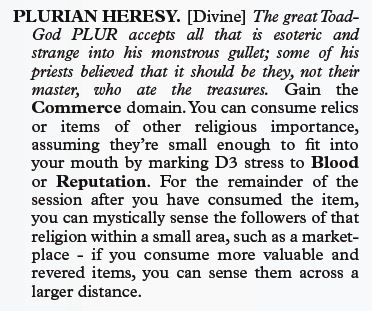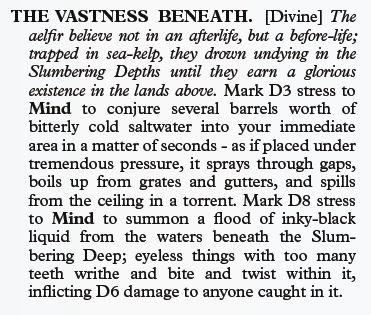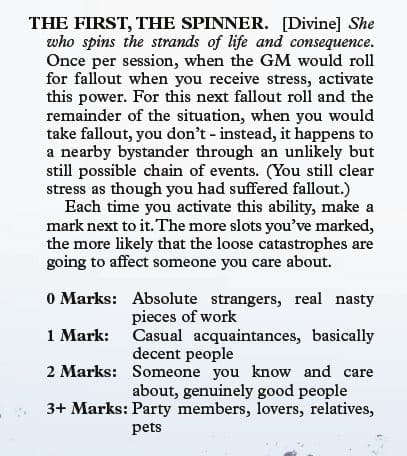The Gutter Cleric is one of the two new classes in Sin, our upcoming sourcebook for the Spire RPG, which is currently on Kickstarter. You can learn more about Sin – and maybe even secure yourself a copy – by clicking here.

THE GUTTER CLERIC

“Azur! Charnel! Limyé! Incarne! Merhor! Great Damnou! Uh, Brother Harvest? Plür? Is ANYONE listening up there?”
You are on the cutting edge of Applied Theology. Wielding miracles granted by a dozen gods, you are somewhere between a field researcher and a metaphysical con artist who tricks forbidden, dead or merely unpopular deities into blessing you with their aid and hiding from their sight before they realise what happened.
We’ve been toying with the idea of the Gutter Cleric for a long time. They were one of the original classes in the Spire corebook, but we couldn’t figure out how to make them work without being jarring – despite the game definitely being about religious magic and unorthodox uses of same, they didn’t quite fit. We called them GODHACKERS as a placeholder name, which maybe explained why we never managed to make them fit into the game; it doesn’t gel with Vermissian Sage and Carrion-Priest.
Anyway. We’re better games designers now, and we needed classes for a new book, so we went back to our old ideas and saw if we could do them justice. Turns out that changing the name from Godhacker to Gutter Cleric – a name with heavy overtones of the Junk Mage, their counterpart in Heart – gave us the inspiration we needed to properly build them out. Rather than being an academic innovator, the Gutter Cleric became a sort of desperate con artist who was ripping off gods by pretending to be faithful just long enough to earn a miracle.
EQUIPMENT
Gutter Clerics start with either a big heavy self-written holy book (D3, Defensive, Surprising) or a one-shot improvised pistol and a cut-throat razor, which are popular recruitment tools in the grim backstreets of Pilgrim’s Walk. You have two options: either a sort of bumbling scholar who hits people over their head with a bible or the sort of bastard who’d sell your grandma for a sack of hooky relics. Both are good.
CORE ABILITIES
PETTY COMMUNION allows you to speak with the small gods of objects and talk with them; the more important the object, the less it cares about what you have to say. BOOTLEG MIRACLE lets you go slightly mad or attract unwanted attention in exchange for rolling with mastery on any roll you like. I’m mainly telling you about these because I’m happy with the names.
ADVANCES
We matched each tier of advances to a tier of gods – unpopular gods for low advances (or things that aren’t quite gods at all – they can siphon Idol powers, for example), the Nine Forbidden Faiths for the medium advances, and then ancient Titan-esque precursor gods for the high advances.

Eagle-eyed readers of Spire will note that we have not really defined what the Nine Forbidden Faiths are (and indeed we go on to imply that there are actually Seven Forbidden Faiths in the sentence immediately afterwards due to a typo) and that there’s been no mention of precursor gods at all so far in the text, so it was both fun and a challenge to come up with things that fit the tone of Spire whilst making for a fun class and not contradicting any lore that we’d established in the past. (Or: contradicting it in an interesting way, at least.)

So the medium advances focus primarily on the banned Old Gods of the aelfir (The Void Above, The Beast Beyond The Walls, The Fire Stolen) which was fun, because we got to flesh out the history of the high elves and imply some stuff about their difficult past in the Frozen North. It’s also nice to give players an option to use the gods of their oppressors against them, I think.

We wanted to show the experimental/improvised nature of the Gutter Cleric by giving them two different power levels in each medium advance – one for a low stress cost, and one for a high stress cost. This puts them somewhere between traditional reliable Divine magic users and riskier Occult casters. The high advances let us really mess with the mechanics of the game, because we wanted to show that these gods are different from the other gods we’ve seen so far, as you can tell from this ability which lets outright ignore fallout as long as you don’t mind it accidentally hitting increasingly familiar people instead:

INSPIRATIONS
I really like that scene in The Mummy where Benni, the sort-of-villain character who wears a fez, gets threatened by the titular Mummy, and starts cycling through holy symbols and prayers from different religions in an attempt to gain divine protection. The Gutter Cleric is basically a whole class about that.

Of course, there’s a lot of crossover with the Junk Mage, and both of them share DNA with the characters in an unpublished novel I wrote called God In The Attic which features a con-artist demonologist who spends the entire book lying to demons and passing off crap he bought at a pound shop as ancient relics in back-room sacrifices. I will continue making characters who lie to supernatural entities and maybe get away with it until my demands are met (i.e. the novel is published).


Comments
There are no comments yet.